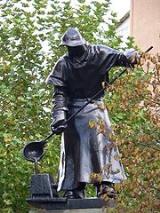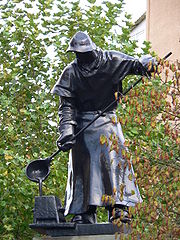
Neunkirchen, Saarland
Encyclopedia
Neunkirchen is a town and a municipality in Saarland
, Germany
. It is the largest town in, and the seat of the district of Neunkirchen
. It is situated on the river Blies
, approx. 20 km northeast of Saarbrücken
. With about 50,000 inhabitants, Neunkirchen is Saarland's 2nd largest city. The name of the town derives from "An der neuen Kirche" meaning "by the new church" not from "nine churches" as one might be tempted to assume. In the past, Neunkirchen's economy has been shaped almost exclusively by coal and steel. With the decline of this industry sector, Neunkirchen's economy had to face drastic changes and underwent a significant shift towards the service and retail sector, although smaller industries still remain.
 The earliest settlements in the area can be dated back to 700BC. The oldest part of the town is the village of Wiebelskirchen north of the town centre; its name has been recorded as early as 765 (AD) and is thus the oldest Christian name in town ("Kirche" means church). The name "Neunkirchen" is recorded for the first time in 1281.
The earliest settlements in the area can be dated back to 700BC. The oldest part of the town is the village of Wiebelskirchen north of the town centre; its name has been recorded as early as 765 (AD) and is thus the oldest Christian name in town ("Kirche" means church). The name "Neunkirchen" is recorded for the first time in 1281.
Neunkirchen belonged to the principality of Nassau-Saarbrücken, who erected two castles nearby (which do not exist any more today, but the ruins of one of them are the base of a little park-like area.
The famous German poet, geologist and author Johann Wolfgang von Goethe visited Neunkirchen and described the Castle and the Ironworks.
Having a big ironworks complex right in the town centre made the town a target for Allied bomb raids in the Second World War. In 1945, an air raid destroyed about three quarters of the town centre. Due to that, there are many malfunctioning WW2 bombs that didn't explode and can be found even today.
Erich Honecker
visited his birthplace Neunkirchen.
Much of the city's fate was influced by the von Stumm-Halberg family, who owned the local ironworks from 1806 onwards, and thus had enormous influence on the local politics.
Due to the decline of the coal and steel industry, the local economy faced aggravating hardships. With the last coal mine closing down in 1968 and the major part of the ironworks complex closing down in 1982 (only a steel-mill is still in service today), the unemployment rate rose drastically.
Meanwhile, the city has transformed into a "shopping town", a process that had been started with the construction of a large shopping centre on the grounds of the former steelworks.
Remnants of the former steelworks that had not been destroyed meanwhile have been preserved and renovated. They now serve as an industrial monument; parts of them feature small pubs, clubs, a cinema, the first of the German branch of Hooters of America, Inc
restaurants and a radio studio of the McDonald's
fast food chain.
, General Secretary of the Socialist Unity Party
of East Germany from 1971–1989, and Chairman of the Council of State of the German Democratic Republic
from 1976–1989, was born in Neunkirchen and later moved to Wiebelskirchen, a village that belongs to the city of Neunkirchen, but sits a little outside of the inner city area.
Saarland
Saarland is one of the sixteen states of Germany. The capital is Saarbrücken. It has an area of 2570 km² and 1,045,000 inhabitants. In both area and population, it is the smallest state in Germany other than the city-states...
, Germany
Germany
Germany , officially the Federal Republic of Germany , is a federal parliamentary republic in Europe. The country consists of 16 states while the capital and largest city is Berlin. Germany covers an area of 357,021 km2 and has a largely temperate seasonal climate...
. It is the largest town in, and the seat of the district of Neunkirchen
Neunkirchen (German district)
Neunkirchen is a Kreis in the middle of the Saarland, Germany. Neighboring districts are Sankt Wendel, Kusel, Saarpfalz, Saarbrücken, and Saarlouis.-History:...
. It is situated on the river Blies
Blies
The Blies is a right tributary of the Saar River in south-western Germany and north-eastern France . The Blies flows from three springs in the Hunsrück mountains near Selbach, Germany. It is approximately 100 km long, ending in the French city of Sarreguemines...
, approx. 20 km northeast of Saarbrücken
Saarbrücken
Saarbrücken is the capital of the state of Saarland in Germany. The city is situated at the heart of a metropolitan area that borders on the west on Dillingen and to the north-east on Neunkirchen, where most of the people of the Saarland live....
. With about 50,000 inhabitants, Neunkirchen is Saarland's 2nd largest city. The name of the town derives from "An der neuen Kirche" meaning "by the new church" not from "nine churches" as one might be tempted to assume. In the past, Neunkirchen's economy has been shaped almost exclusively by coal and steel. With the decline of this industry sector, Neunkirchen's economy had to face drastic changes and underwent a significant shift towards the service and retail sector, although smaller industries still remain.
Early history

Neunkirchen belonged to the principality of Nassau-Saarbrücken, who erected two castles nearby (which do not exist any more today, but the ruins of one of them are the base of a little park-like area.
The famous German poet, geologist and author Johann Wolfgang von Goethe visited Neunkirchen and described the Castle and the Ironworks.
Weimar Republic
Neunkirchen was awarded township as late as 1922 after having been the largest village in Prussia for some time.Nazi era and World War II
On 10 February 1933, an explosion of a giant gas tank at the ironwork caused 68 casualties, 190 injured. The damage spread over a part of the factory and also hit a nearby residential area and a school building. The duration of repair work and temporary closing of the damaged parts of the iron works was about nine months. This event caused worldwide media attention.Having a big ironworks complex right in the town centre made the town a target for Allied bomb raids in the Second World War. In 1945, an air raid destroyed about three quarters of the town centre. Due to that, there are many malfunctioning WW2 bombs that didn't explode and can be found even today.
Post World War II
On September 10, 1987, General Secretary of the Socialist Unity PartySocialist Unity Party of Germany
The Socialist Unity Party of Germany was the governing party of the German Democratic Republic from its formation on 7 October 1949 until the elections of March 1990. The SED was a communist political party with a Marxist-Leninist ideology...
Erich Honecker
Erich Honecker
Erich Honecker was a German communist politician who led the German Democratic Republic as General Secretary of the Socialist Unity Party from 1971 until 1989, serving as Head of State as well from Willi Stoph's relinquishment of that post in 1976....
visited his birthplace Neunkirchen.
Economy
There are traces of surface coal mining that reach back as far as 700BC. Later on, coal was mined underground until 1968. In 1593, the first ironworks were constructed in the Blies valley. The iron ore used was from local origin.Much of the city's fate was influced by the von Stumm-Halberg family, who owned the local ironworks from 1806 onwards, and thus had enormous influence on the local politics.
Due to the decline of the coal and steel industry, the local economy faced aggravating hardships. With the last coal mine closing down in 1968 and the major part of the ironworks complex closing down in 1982 (only a steel-mill is still in service today), the unemployment rate rose drastically.
Meanwhile, the city has transformed into a "shopping town", a process that had been started with the construction of a large shopping centre on the grounds of the former steelworks.
Remnants of the former steelworks that had not been destroyed meanwhile have been preserved and renovated. They now serve as an industrial monument; parts of them feature small pubs, clubs, a cinema, the first of the German branch of Hooters of America, Inc
Hooters
Hooters is the trade name of two privately held American restaurant chains: Hooters of America, Incorporated, based in Atlanta, Georgia, and Hooters, Incorporated, based in Clearwater, Florida...
restaurants and a radio studio of the McDonald's
McDonald's
McDonald's Corporation is the world's largest chain of hamburger fast food restaurants, serving around 64 million customers daily in 119 countries. Headquartered in the United States, the company began in 1940 as a barbecue restaurant operated by the eponymous Richard and Maurice McDonald; in 1948...
fast food chain.
Personalities
Erich HoneckerErich Honecker
Erich Honecker was a German communist politician who led the German Democratic Republic as General Secretary of the Socialist Unity Party from 1971 until 1989, serving as Head of State as well from Willi Stoph's relinquishment of that post in 1976....
, General Secretary of the Socialist Unity Party
Socialist Unity Party of Germany
The Socialist Unity Party of Germany was the governing party of the German Democratic Republic from its formation on 7 October 1949 until the elections of March 1990. The SED was a communist political party with a Marxist-Leninist ideology...
of East Germany from 1971–1989, and Chairman of the Council of State of the German Democratic Republic
Leaders of East Germany
The political leadership of East Germany was in the hands of several offices.Prior the proclamation of an East German state, the Soviets established in 1948 the German Economic Commission as a de facto government in their occupation zone...
from 1976–1989, was born in Neunkirchen and later moved to Wiebelskirchen, a village that belongs to the city of Neunkirchen, but sits a little outside of the inner city area.

